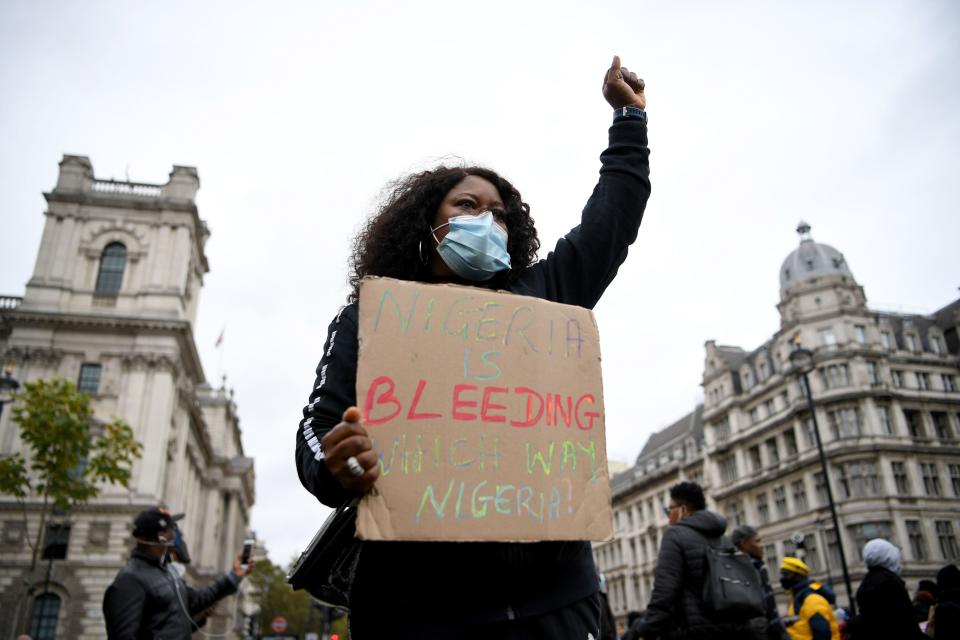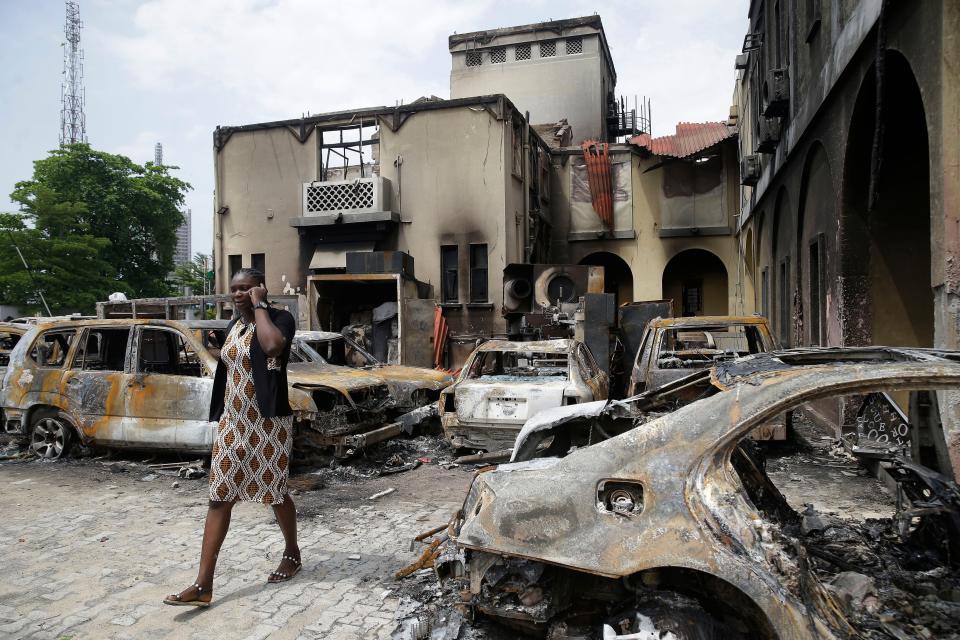Nigeria's #EndSARS protesters draw inspiration from Black Lives Matter movement
ABUJA, Nigeria — For weeks, young Nigerians rallying behind the hashtag #EndSARS have filled the streets of major cities across Nigeria demanding the dissolution of the Special Anti-Robbery Squad (SARS), a police unit that has in recent years been publicly criticized for extortion of citizens, kidnappings, extrajudicial killings and illegal arrests.
The protesters are expressing deep anger at the aggression of the police unit and their campaign has drawn support from Nigerians in the diaspora, as hundreds have also marched in cities like Toronto, Paris, London and New York.
The demonstrations, which harken to the Black Lives Matter movement in the United States, have drawn massive support from the international community especially the U.S., where celebrities such as Beyoncé, Rihanna and Kanye West have joined BLM activists, including one of the movement’s co-founders Opal Tometi, in expressing their support for #EndSARS.

"If some of us didn't see how Black Lives Matter protesters in America forced some local governments to defund their police departments, we wouldn't have believed it is possible for any action to be taken against the police," Okon Nya, editor of popular Nigerian sports website Busy Buddies, told USA TODAY. "What can be achieved in the United States can also be achieved here in Nigeria."
President Muhammadu Buhari announced the disbandment of the police squad on Oct. 12, the #EndSARS campaigners’ biggest achievement to date. Buhari has said 51 civilians have been killed in the protests, along with 11 police officers and seven soldiers.
Many protesters, inspired by BLM to expand the scope of the campaign, are calling for full systemic reform of the police, punishment of officers guilty of brutality and compensation for SARS victims. Protests in the two countries carry the same message: The killing of citizens by police officers with impunity should never be allowed to happen in a free country.
However, while on Friday a police statement said the inspector general told visiting lawmakers and oversight officials that “the force is more than ever before committed to police reforms and ensuring a safe and secure environment for all to live and thrive devoid of any violation of their fundamental human rights," the tone changed over the weekend.
Nigeria’s top police official on Saturday ordered the immediate mobilization of all officers to “reclaim the public space from criminal elements masquerading as protesters.”
The police order could further heighten tensions in Africa’s most populous country after its worst turmoil in years. Nigeria’s inspector general of police, M.A. Adamu, ordered colleagues to “dominate the public space” while announcing that enough is enough, a statement said.

The new police order came even as a 24-hour curfew loosened for the first time Saturday in Lagos, a city of some 20 million where glittering wealth and grinding poverty are in sharp contrast, inflaming grievances over inequality and corruption.
The police inspector general “enjoins law-abiding citizens not to panic but rather join forces with police … to protect their communities from the criminal elements,” the statement said.
SARS was formed 28 years ago to combat armed robbery and other serious crimes. The first time Nigerians campaigned for its dissolution was in 2017 when many took to social media to express their frustration at the aggression of officers. Similar to the way Black Lives Matter started years ago but demonstrations were reignited by the death of George Floyd, the latest #EndSARS campaign has also been fired up by videos of brutality shared on social media, such as an Oct. 3 video on Twitter that claimed to show SARS officers killing a boy and taking his vehicle. It was a breaking point for many youths who themselves had been profiled by SARS operatives. Unlike previous years when campaigns were mostly held online, thousands of people this time decided to also take their protests to the streets.
Mehn... 😥 https://t.co/6wmSLC6Vld pic.twitter.com/juLs7r0iOK
— Chinyelugo (@AfricaOfficial2) October 3, 2020
"Because Black Lives Matter had raised awareness about police brutality in the U.S., we knew it would be easy for the world to relate with the problems of police brutality in Nigeria,” said Derick Etta, a protester in the southern city of Calabar.
However, demonstrations have been far deadlier in Nigeria, as Nigerian authorities have used excessive force in dealing with largely peaceful demonstrators.
At least 69 people have died since the nationwide street protests began on October 8. The bloodiest day was nearly a week ago when security forces reportedly killed more than a dozen protesters.
Protesters in Lagos, Nigeria's commercial capital, told USA TODAY that at about 6:30 p.m. local time on Oct. 20 soldiers arrived in pickup trucks at Lagos' Lekki toll gate and began to fire tear gas and bullets at hundreds of demonstrators who were singing the national anthem at the time. Before the shootings, several people tweeted images appearing to show government officials removing CCTV cameras at the toll gate and the street lights were reportedly turned off. The actual death toll still isn't clear but Amnesty International said about a dozen people were killed in Lekki and in nearby Alausa by security officers that evening.
"The soldiers barricaded the [Lekki toll gate] protest site before they started shooting," said Chibuzor Emma, a freelance journalist who was at the scene. "They shot consistently for almost an hour and people were running and screaming, some were hit."
The incident occurred moments after Lagos Governor Babajide Sanwo-Olu announced a curfew across the state of over 20 million people and after nearly three chaotic weeks of demonstrations leading to widespread social unrest.
Hours after the shootings, a number of buildings went up in flames across Lagos, including a bus station at the Oyingbo district and the headquarters of the Nigerian Ports Authority.
"There's smoke everywhere and no one can breathe around there," said Otto Eyong, a banker who lives near a Lagos grocery store that was razed after Tuesday's shootings. "I've had to temporarily move out of the area and many people have moved to safer places as well."
Buhari finally gave a national address on Thursday night, but made no mention of the shootings in Lekki. Instead, the 77-year-old who ruled Nigeria as a military dictator in the 1980s before returning as an elected civilian president in 2015, denounced activists for spreading “deliberate falsehood and misinformation through the social media” and warned protesters to "resist the temptation of being used by some subversive elements to cause chaos with the aim of truncating our nascent democracy." By not taking action against security forces, some Nigerians have warned, the president could inspire further abuses.
Despite the Nigerian leader showing reluctance in addressing the Lekki incident, the shootings have been roundly condemned around the world, including by Democratic presidential nominee, Joe Biden who urged Buhari and his military forces "to cease the violent crackdown on protesters in Nigeria which has already resulted in several deaths."
Across Nigeria, demonstrations have continued despite the threat of violence posed by security officials. Protesters hope #EndSARS will gain the same awareness as Black Lives Matter.
"If everyone—from athletes to journalists—can talk about SARS brutality in Nigeria like they've done with Black Lives Matter, the Nigerian government will be pressured to take necessary action," said Chuma Nnoli, a popular radio talk show host at Nigeria Info FM in Lagos. "All we want is an end to the senseless killing of young people in Nigeria."
Contributing: Associated Press
This article originally appeared on USA TODAY: Nigeria's #EndSARS protesters draw inspiration from Black Lives Matter

